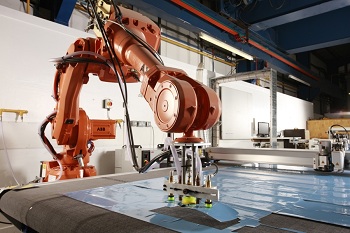A consortium, led by Umeco and partnered by Aston Martin Lagonda, Delta Motorsport Ltd., ABB Robotics and Pentangle Engineering Services Ltd., has been established to examine the potential for using high-performance composites in mainstream automotive applications.
 Automation of ply kitting techniques
Image: © Umeco 2012
Automation of ply kitting techniques
Image: © Umeco 2012
Named 'ACOMPLICE' (Affordable COMPosites for LIghtweight Car StructurEs), the partnership will address the growing pressure on the mainstream automotive sector to manufacture lighter-weight; fuel-efficient vehicles which meet reduce CO2 emission targets. Aluminium and high-strength, steel-based alloys have been employed in response to this, but the physical limitations of these materials have, to a large extent, already been reached, so other options are being pursued.
With a total budget of £1.5million - part-funded by the Technology Strategy Boards' Collaborative Research and Development programme, ACOMPLICE proposes to demonstrate the developed technologies through the rapid manufacture of selected structural automotive parts.
Over the next two years, ACOMPLICE aims to significantly reduce the cost of composite body-in-white vehicle structures for the mainstream automotive sector. It is envisaged that the objective can be achieved by the development of pre-impregnated broad application materials suitable for robotic lamination and fast cure technologies.
Umeco's role in ACOMPLICE is to develop fast cure, highly-efficient prepregs, enabling the rapid robotic manipulation and placement of individual plies. Novel materials formatting and moulding techniques will be developed alongside these technologies in order to optimise component output rates. Umeco's DForm product will also be used in combination with novel, rapid perform technology in order to facilitate the lamination of complex shaped geometries via automated processes.
DForm is Umeco's deformable composite system, a time and cost-saving prepreg technology that combines the conformability of a short fibre moulding compound with the directional characteristics of a high performance, long fibre composite.
Elaine Arnold, Project Manager - Collaborative Research and Technology at Umeco said: "The automotive industry is being forced to seek new technologies in order to comply with the ever tightening, legislative push towards reducing CO2 emissions. The outcome of the ACOMPLICE project should be able to make a significant contribution towards achieving this goal, and offer interesting solutions for this industry and others, where lightweighting is fundamental."